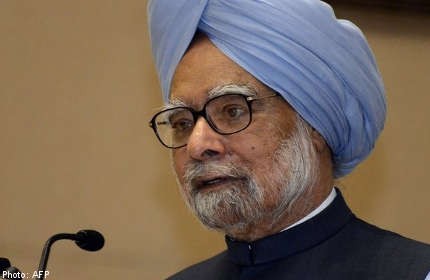India PM leaves for Russia, China

NEW DELHI - Indian Prime Minister Manmohan Singh left Sunday for a four-day trip to Russia and China aimed at strengthening trade ties and addressing a festering border dispute with Beijing.
The prime minister will also look to secure energy, defence and other economic deals in both countries.
In a statement before leaving India, the 81-year-old spoke of the longstanding defence and trade ties with Russia.
"The scope of our relationship with Russia is unique, encompassing strong and growing cooperation in areas such as defence, nuclear energy, science and technology, hydrocarbons, trade and investment," he said in a statement.
Singh added he would try to address "areas of concern" during his visit to Beijing.
"India and China have historical issues and there are areas of concern," he said, adding they would not affect "the overall atmosphere of friendship and cooperation".
India seeks a breakthrough in a border row with China that has soured relations for decades, after the leaders of the two Asian giants pledged earlier this year to build trust.
Singh will meet President Vladimir Putin in Moscow on Monday with the focus on arms purchases.
India, which is spending billions of dollars upgrading its military, has been Russia's top weapons buyer for years.
Both countries will also be looking to seal accords on the next phase of a Russian-built nuclear power project on India's south coast. The project is designed to help meet India's surging demand for electricity, but has been dogged by delays and protests over safety.
Singh will head to China on Tuesday looking to forge closer economic ties and ink a pact to ease tension along their disputed border in a remote Himalayan region, following a flare-up in April.
India accused Chinese troops of intruding nearly 20 kilometres (12 miles) into Indian-held territory, sparking a three-week standoff that was only resolved when troops from both sides eventually pulled back.
China and India fought a brief war in 1962 and the border between the two nations has never been properly demarcated, although they have signed accords to maintain peace.
Singh and his Chinese counterpart Li Keqiang will hold talks Wednesday on the issue, after both pledged to resolve the dispute during Li's visit to India in May.
Singh will also seek progress on closing the trade gap, including through increased Chinese investment through Chinese industrial parks in India.
China is India's biggest trading partner, with two-way commerce totalling US$67.83 billion last fiscal year, up from US$2.1 billion in 2001-02.
But India's trade deficit with its neighbour soared to US$40.77 billion last year from just US$1.08 billion in 2001-02, Indian figures show.
Singh said the world's two most populous countries have a "growing congruence of regional, global and economic interests".
"The list of areas of our bilateral cooperation is impressive - trade, investment, infrastructure, trans-border rivers, energy, agriculture, science and technology... we hope to take forward our engagement in many of these areas during my visit," he added.